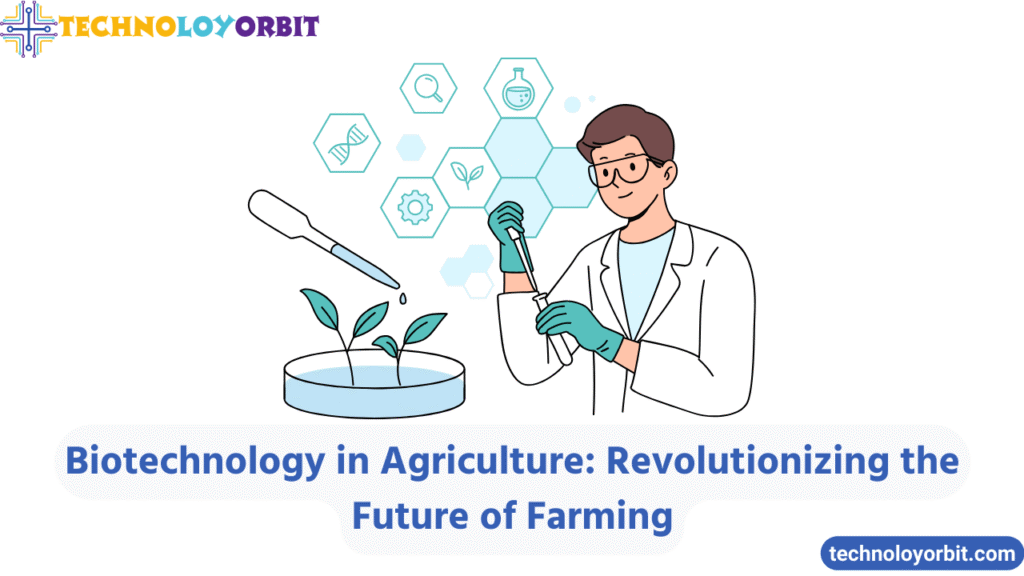Biotechnology in agriculture applies advanced scientific techniques to enhance crop yields, improve sustainability, and address global challenges like food security, climate change, and environmental conservation effectively.
In recent years, biotechnology in agriculture has emerged as a transformative force in modern farming. As the global population continues to grow, the demand for sustainable food production has skyrocketed. Biotechnology offers innovative solutions to address these challenges, from increasing crop yields to reducing environmental impacts. This article delves into the multifaceted role of biotechnology in agriculture, exploring its benefits, applications, and future potential. With advancements in genetic engineering, molecular biology, and precision farming, biotechnology is paving the way for a greener, more productive agricultural sector.
What is Biotechnology in Agriculture?
Biotechnology in agriculture refers to the application of scientific techniques to modify plants, animals, and microorganisms for enhanced agricultural productivity. This field combines biology with technology to develop tools that solve agricultural problems.
Key aspects of agricultural biotechnology include:
- Genetic engineering: Altering the genetic makeup of organisms to improve traits such as drought resistance or pest tolerance.
- Tissue culture: Propagating plants in controlled environments.
- Marker-assisted selection: Using DNA markers to identify desirable traits in plants or animals.
For example, genetically modified organisms (GMOs) are a common product of agricultural biotechnology. Crops like Bt cotton and Golden Rice demonstrate how biotechnology can enhance productivity and address nutritional deficiencies.
The Role of Biotechnology in Crop Improvement

Crop improvement through biotechnology has revolutionized traditional farming practices. Farmers now have access to genetically enhanced seeds that offer higher yields and resilience against various stresses.
Key benefits include:
- Pest resistance: Crops like Bt corn are engineered to produce proteins toxic to specific pests, reducing the need for chemical pesticides.
- Drought tolerance: Biotechnology helps develop crops that can thrive in water-scarce regions, ensuring food security.
- Nutritional enhancement: Crops like Golden Rice are fortified with essential nutrients, addressing malnutrition in developing countries.
One of the major breakthroughs is CRISPR-Cas9, a gene-editing tool that enables precise modifications in plant genomes. This technology is being used to develop crops with improved traits without introducing foreign DNA, ensuring public acceptance.
| Crop | Biotechnological Improvement | Impact |
|---|---|---|
| Bt Cotton | Pest resistance | Reduced pesticide use |
| Golden Rice | Vitamin A enrichment | Combating malnutrition |
| Drought-resistant Maize | Enhanced water efficiency | Food security |
Environmental Benefits of Biotechnology in Agriculture
Biotechnology is not only about increasing productivity but also about reducing the environmental footprint of agriculture. Traditional farming practices often rely heavily on chemical inputs, leading to soil degradation and water pollution. Biotechnology offers sustainable alternatives.
- Reduced pesticide usage: Pest-resistant crops like Bt cotton minimize the need for chemical pesticides, preserving biodiversity and reducing water contamination.
- Lower greenhouse gas emissions: Nitrogen-efficient crops reduce the dependency on synthetic fertilizers, which are significant contributors to greenhouse gases.
- Soil conservation: Biotechnology enables the development of cover crops that protect soil health and prevent erosion.
These innovations align with global efforts to combat climate change and ensure environmental sustainability in agriculture.
Biotechnology and Food Security

Food security is a pressing global challenge, with millions of people facing hunger and malnutrition. Biotechnology offers practical solutions to ensure that every individual has access to sufficient, safe, and nutritious food.
Key contributions include:
- Increased productivity: High-yield crops ensure that farmers can produce more food on limited land.
- Resilience to climate change: Crops engineered for extreme weather conditions help maintain food supply despite environmental challenges.
- Reduction of post-harvest losses: Biotechnology has developed storage-friendly crops, extending shelf life and reducing food waste.
For instance, genetically modified bananas resistant to Panama disease are a promising innovation to secure the livelihoods of millions of farmers dependent on this staple crop.
Biotechnology in Livestock Improvement
While much attention is given to crop biotechnology, its applications in livestock are equally significant. Genetic tools are used to enhance animal health, productivity, and welfare.
- Disease resistance: Gene editing can create livestock resistant to diseases such as African swine fever.
- Improved productivity: Biotechnological interventions, such as recombinant growth hormones, boost milk production in dairy cattle.
- Ethical breeding: Marker-assisted selection allows for the identification of desirable traits without extensive inbreeding, promoting animal welfare.
These advancements ensure that livestock farming is more efficient and sustainable, meeting the growing demand for animal-based products.
Challenges and Concerns in Biotechnology in Agriculture
Despite its numerous benefits, biotechnology in agriculture faces significant challenges and ethical concerns. Public skepticism and regulatory hurdles often impede its widespread adoption.
Major challenges include:
- Public perception: Misinformation about GMOs has led to resistance from consumers and advocacy groups.
- Intellectual property issues: Patents on genetically modified seeds can create monopolies, disadvantaging small-scale farmers.
- Biodiversity concerns: The widespread use of GMOs could potentially reduce genetic diversity in crops, making them vulnerable to new pests or diseases.
To address these concerns, transparent communication and robust regulatory frameworks are essential. Education campaigns can help build public trust, while policies must balance innovation with ethical considerations.
Future Prospects of Biotechnology in Agriculture

The future of biotechnology in agriculture looks promising, with ongoing research focused on solving pressing global challenges. Emerging technologies like synthetic biology and AI-driven precision farming are set to redefine agricultural practices.
Trends to watch:
- Gene editing for climate-resilient crops: As climate change intensifies, the development of crops that can withstand extreme weather will be crucial.
- Biofortification: Biotechnology will play a vital role in enriching staple crops with essential nutrients to combat malnutrition.
- Microbial biotechnology: Harnessing beneficial microorganisms for natural pest control and soil enhancement is gaining traction.
Collaboration between governments, private sectors, and research institutions will be key to unlocking the full potential of biotechnology in agriculture.
FAQs on Biotechnology in Agriculture
- What is biotechnology in agriculture?
Biotechnology in agriculture involves using scientific techniques to modify organisms for improved productivity, resilience, and sustainability. - What are the benefits of biotechnology in agriculture?
It enhances crop yields, reduces environmental impacts, improves nutritional value, and ensures food security. - Are genetically modified crops safe?
Yes, GM crops undergo rigorous testing for safety and are regulated by authorities before approval for public use. - How does biotechnology address climate change?
It develops climate-resilient crops, reduces dependency on chemical inputs, and lowers greenhouse gas emissions. - What are the challenges of agricultural biotechnology?
Public skepticism, intellectual property concerns, and biodiversity issues are major challenges. - How does biotechnology improve livestock farming?
It enhances disease resistance, productivity, and ethical breeding practices in livestock. - What are examples of GMOs in agriculture?
Bt cotton, Golden Rice, and drought-resistant maize are notable examples. - What is the role of CRISPR-Cas9 in agriculture?
CRISPR-Cas9 allows precise gene editing to improve crop traits without introducing foreign DNA.
Conclusion
Biotechnology in agriculture has proven to be a game-changer, addressing some of the most critical challenges in modern farming. By improving crop yields, reducing environmental impacts, and enhancing food security, biotechnology is shaping the future of agriculture. However, its success hinges on public acceptance, ethical practices, and effective regulation. As we move forward, embracing biotechnology with a balanced approach can help create a sustainable and prosperous agricultural sector for generations to come. Please follow out blog Technoloyorbit.



